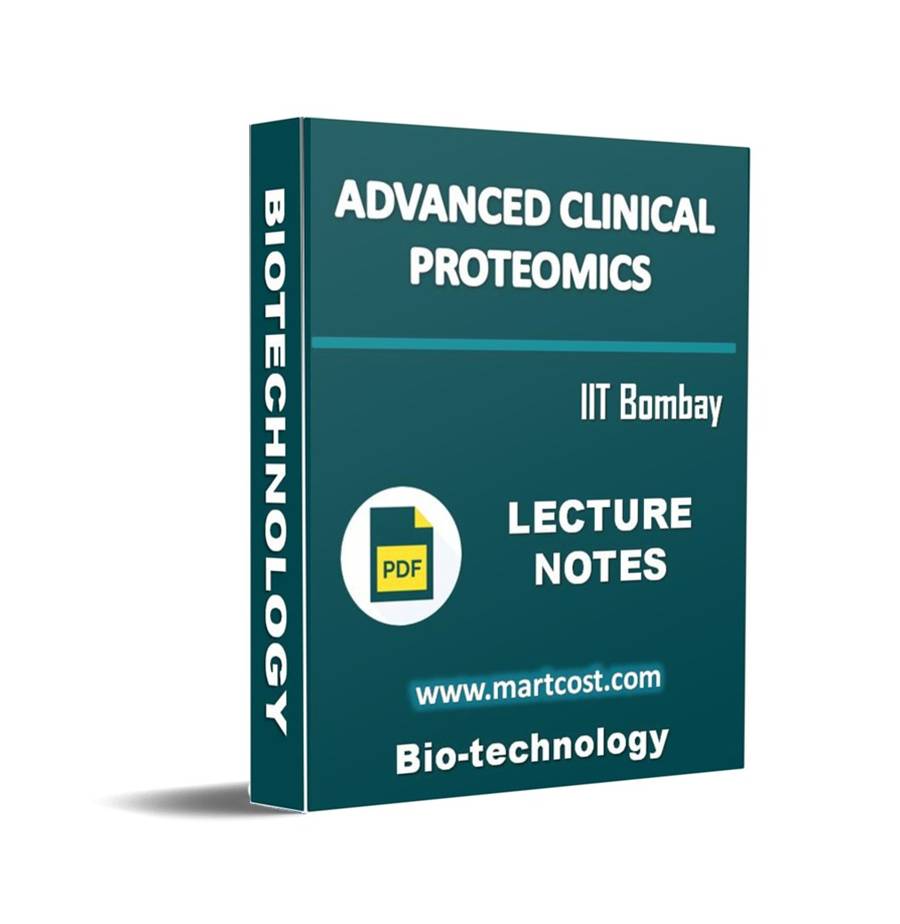Description
Name of Notes : – Advanced Clinical Proteomics Lecture Note
Introduction
Cancer biomarkers have transformed current practices in the oncology clinic. Continued discovery and validation are crucial for improving early diagnosis, risk stratification, and monitoring patient response to treatment. Profiling of the tumour genome and transcriptome are now established tools for the discovery of novel biomarkers, but alterations in proteome expression are more likely to reflect changes in tumour pathophysiology. In the past, clinical diagnostics have strongly relied on antibody-based detection strategies, but these methods carry certain limitations. Mass spectrometry (MS) is a powerful method that enables increasingly comprehensive insights into changes of the proteome to advance personalized medicine. In this review, recent improvements in MS-based clinical proteomics are highlighted with a focus on oncology. We will provide a detailed overview of clinically relevant samples types, as well as, consideration for sample preparation methods, protein quantitation strategies, MS configurations, and data analysis pipelines currently available to researchers. Critical consideration of each step is necessary to address the pressing clinical questions that advance cancer patient diagnosis and prognosis. While the majority of studies focus on the discovery of clinically-relevant biomarkers, there is a growing demand for rigorous biomarker validation. These studies focus on high-throughput targeted MS assays and multi-centre studies with standardized protocols. Additionally, improvements in MS sensitivity are opening the door to new classes of tumour-specific proteoforms including post-translational modifications and variants originating from genomic aberrations. Overlaying proteomic data to complement genomic and transcriptomic datasets forges the growing field of proteogenomics, which shows great potential to improve our understanding of cancer biology. Overall, these advancements not only solidify MS-based clinical proteomics’ integral position in cancer research, but also accelerate the shift towards becoming a regular component of routine analysis and clinical practice.
Modules / Lectures
- Lecture 1: Genomics to Proteomics
- Lecture 2: Basics of Amino acids and Proteins
- Lecture 3: Proteins to Proteomics
- Lecture 4: Sample Preparation for Proteomic Analysis
- Lecture 5: Gel based Proteomics
- Lecture 6: Difference In Gel Electrophoresis for Quantitation of Protein Expression
- Lecture 7: Gel based Proteomic Data Analysis
- Lecture 8: 2D?DIGE Clinical Applications
- Lecture 9: Protein Digestion
- Lecture 10: High Performance Liquid Chromatography Mass Spectrometry
- Lecture 11: Hybrid MS Configurations
- Lecture 12: Tandem Mass Spectrometry for Protein Identification
- Lecture 13: Peptide Mass Fingerprinting
- Lecture 14: In vitro Quantitative Proteomics using iTRAQ
- Lecture 15: iTRAQ Clinical Applications
- Lecture 16: In vivo Quantitative Proteomics using SILAC
- Lecture 17: SILAC Clinical Applications
- Lecture 18: Isotope Coded Affinity Tagging (ICAT)
- Lecture 19: MS for PTM analysis
- Lecture 20: Mid-Semester Examination
- Lecture 21: Interatomic-Techniques to Study Protein Protein Interactions
- Lecture 22: Antigen and Antibody Microarrays
- Lecture 23: Reversed Phase Protein Microarrays
- Lecture 24: Cell free Expression Based Protein Microarrays
- Lecture 25: Nucleic Acid Programmable Protein Arrays
- Lecture 26: Microarrays for Autoantibody Profiling
- Lecture 27: Microarrays for PTM Analysis
- Lecture 28: Label free Proteomics
- Lecture 29: Surface Plasmon Resonance
- Lecture 30: Surface Plasmon Resonance Imaging
- Lecture 31: Protein Interaction Analysis using SPR and SPRi
- Lecture 32: Nanotechnologies in Proteomics
- Lecture 33: Challenges in Clinical Proteomics
- Lecture 34: Serum Proteomics
- Lecture 35: Urine Proteomics
- Lecture 36: Salivary Proteomics
- Lecture 37: Bioinformatics and Proteomics
- Lecture 38: Proteomics for Translational Research
- Lecture 39: Future of Proteomic Technologies for Clinical Applications
- Lecture 40: Final Exam






Reviews
There are no reviews yet